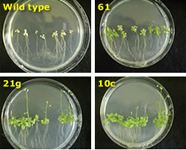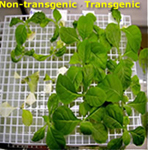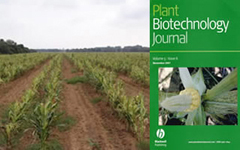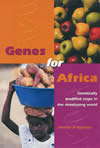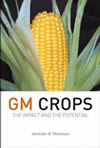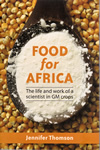Professor Jennifer Thomson
| Research | Books | ||||||||||||||||||||||
|

Professor Jennifer A. Thomson Email: jennifer.thomson@uct.ac.za
|
||||||||||||||||||||||
| Research | ||||||||||||||||||||||
|
Jennifer Thomson's main work, together with Suhail Rafudeeen and Jill Farrant, is to develop transgenic maize tolerant to drought and other abiotic stresses. The source of their genes is the 'resurrection plant' Xerophyta viscosa, an extremophile that can tolerate up to 95% dehydration. |
||||||||||||||||||||||

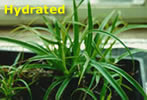
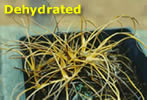
The 'resurrection plant' Xerophyta viscosa |
||||||||||||||||||||||
|
She also works, together with Prof. Ed Rybicki and Dr Dionne Shepherd, on the development of maize resistant to the African endemic geminivirus, Maize streak virus. She helped draft South Africa 's National Biotechnology Strategy and was appointed by the Minister of Science and Technology to the National Advisory Council on Innovation. She is the co-founder of SA WISE (SA Women in Science and Engineering) . Internationally she is on the board of the International Service for the Acquisition of Agri-Biotech Applications and the African Agricultural Technology Foundation. She is a frequently invited speaker at conferences, including the World Economic Forum. During 2004 she won the coveted L'Oréal/Unesco award for women in science. The award, which is worth US$100 000(about R650 000), was given for her research into the resistance shown by transgenic plants to viral infections, drought and other risks. The fact that Jennifer has been given the L'Oréal/Unesco award shows that many top scientists abroad share the view that problems arising from genetic modification can be scientifically contained. Professor Thomson in the media: Fair Lady (November 2013); Tatler (October 2013) |
||||||||||||||||||||||
|
||||||||||||||||||||||
GMOs: Facts and Fictions
|
| Books | ||
| Genes for Africa: genetically modified crops in the developing world | GM crops: the impact and potential |
Food for Africa: the life and work of a scientist in GM crops |

|
In Genes for Africa , Jennifer Thomson separates fact from fiction and explains why and how GM crops can help combat poverty, starvation and disease in the developing world, in a safe and responsible way. |
|
"This is a gem of a book. It is clear and concise, it makes the complex seem simple without losing the essential truths, and, as far as I can tell, it is accurate, with no innuendo, no half-truth and no wild extrapolation." - Gordon Conway, President of the Rockerfeller Foundation, USA, published in Nature, Jan 2003. " We have reassurances from those with a financial stake in GM technology that all is well and allegations from the anti-GM lobby that these organisms present a clear danger to the environment and human health. The truth, of course, is somewhere in between these two positions, and the public deserves a more factual and reliable source of information on this issue." - Michael Shelby, National Institute of Environmental Health Sciences USA. "True environmentalism recognises the need for development, for growing food and making livelihoods available to the poor, and aims to minimise the risks and danger that are entailed. You will find the real facts discussed here and placed before you in an enthusiastic but always scientifically controlled way." -George Ellis, Department of Mathematics and Applied Mathematics, UCT.
|
|
| This book has been published by UCT Press (© 2002) and is available by writing to the following address: P.O. Box 24309 Landsdowne 7779 South Africa
|
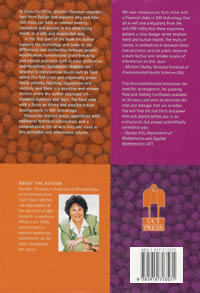
|
GM Crops: The Impact and Potential
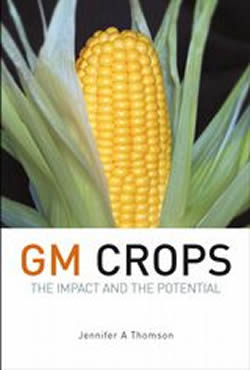
|
Genetically modified crops - are they monsters of nature or could they provide answers to some of our most pressing environmental concerns? Will they create superweeds, run amock and change life as we know it, or are these fears greatly exaggerrated? Internationally respected microbiologist Jennifer Thomson takes us through the issues and concerns surrounding the development of genetically modified crops and their impacts on the environment. She explains how such crops are developed and assessed and discusses the likelihood of negative effects on biodiversity, pollen spread, and organic farming. GM crops may have tremendous potential for addressing some of the world's environmental problems and protecting the planet, particularly in developing countries - in fact we could face more harm if some of these technologies are not adopted. |
|
"The author...has done an excellent job of addressing virtually all of the concerns of those who throw rocks at plants altered through modern genetic technology. Thomson provides lots of data and documentation to support her conclusions. Given the breath of this field and the speed at which it is moving, this book provides those of us working in particular aspects of the discipline with a good overview of areas we simply don’t have time to follow...The book is filled with interesting statistics and Dr. Thomson does a masterful job of debunking issues raised by the anti-GMO groups in a non-confrontational way. I highly recommend this book with no reservations. " - L. Curtis Hannah, Plant Molecular and Cellular Biology Program, University of Florida. "Thomson's view through the magnifying glass is rewarding. Readers will find many aspects of GM crops identified and discussed in an open, balanced manner. Social, economic and safety concerns are addressed directly and clearly. It is rewarding to see a competent author put forward clear messages on a concise manner...The author puts the emphasis on the right topics at the right time and openly addresses the reasons for concern regarding GM crops in the developing world. To get all of this into a brief book is clearly a great accomplishment." - Joel I. Cohen, published in Nature Biotechnology , July 2007. |
|
|
ISBN 978 0 64309 160 3 Also published as Seeds for the Future: The Impact of Genetically Modified Crops, by Comstock Publishing Associates, a division of Cornell University Press, Ithaca, New York, 2007.
|
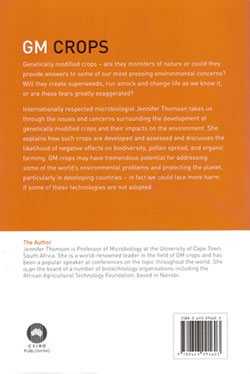
|
Food for Africa: the life and work of a scientist in GM crops
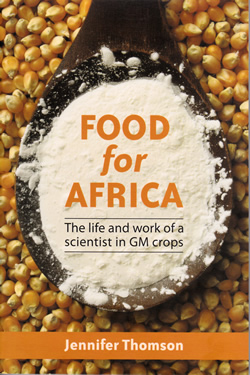
|
Jennifer Thomson is one of the world's leading advisors on genetically modified crops. In Food for Africa, she traces, through anecdote and science, her career and the development of this area of research - from the dawn of genetic engineering in the USA in 1974, through the early stages of its testing in Europe and regulation in South Africa, to the latest developments in South Africa, where an updated Bioeconomy Strategy was approved in early 2013. As a young scientist, she chose to study bacterial genetics, negotiating her way in a very male-dominated arena. It led to her path-breaking involvement in the development of GM research in South Africa - where approximately 80% of maize grown currently is genetically modified for insect and herbicide resistance - and the spread of this technology to other parts of Africa. Experiments conducted with smallholder farmers in Kenya, Uganda, Tanzania and Mozanbique now mean that insect-resistant cowpea, disease-resistant bananas, virus-resistant cassava, drought-tolerant maize and vitamin-enriched sorghum can be grown in Africa successfully. This book describes a remarkable personal and sceintific evolution and looks to a future in which GM technology allows for the possibility of achieving food security throughout Africa by means of staple crops grown in difficult conditions by smallholder farmers. "The work of Jennifer Thomson has been transformational in demonstrating the value of biotechnology to food security on a continent that suffers from droughts and adverse weather patterns." - Dr Mamphela Ramphele |
|
ISBN 978 1 92049 981 5
|
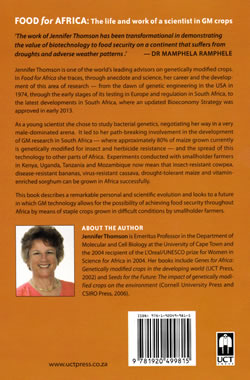
|

